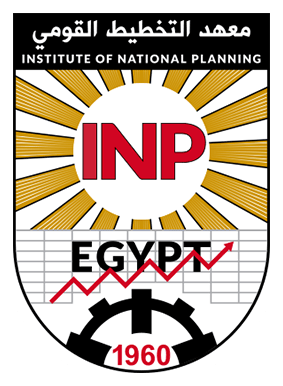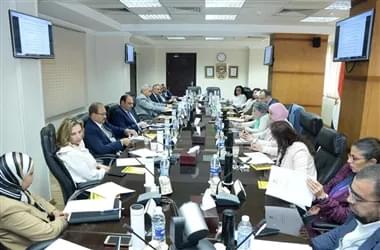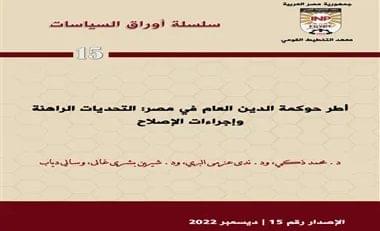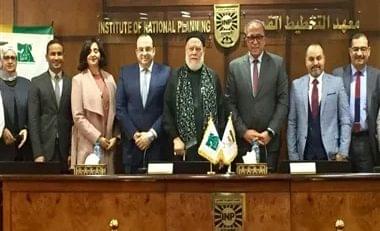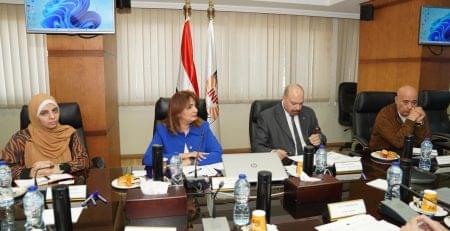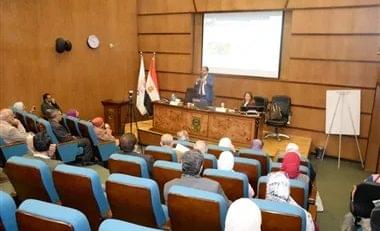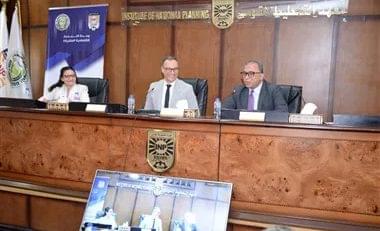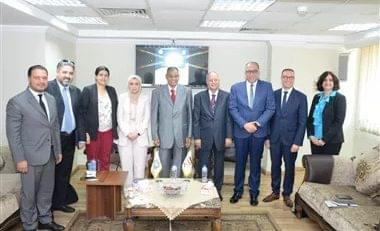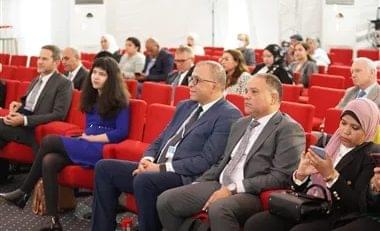The Institute of National Planning holds the sixth session of the meeting of experts
Entitled “Exchanging Government Experiences in the Field of Data”
Within the framework of the Institute of National Planning’s keenness to keep abreast of the technological development supported by multiple data and related technologies, the sixth session of the expert meeting was held under the title “Exchanging Government Experiences in the Field of Data”, for the academic season 2022/2023. The Institute is interested in holding these meetings based on His vision as a national house of expertise and a think tank to support decision-making and policy-making with the data revolution and its applications and the importance it represents to support the achievement of national sustainable development goals and policies.
Dr. Ashraf Saleh, Vice President of the Institute for Training, Consultation and Community Service Affairs, Dr. Fadia Abdel Salam, General Coordinator of the Experts’ Meeting, and a group of professors and experts specialized in this field participated in the meeting.
In this regard, Dr. Fadia Abdel Salam, General Coordinator of the Expert Meeting, indicated that the seminar reviewed the efforts of the General Authority for Survey in the field of spatial maps, and discussed the challenges of not linking data and statistics spatially, such as the inability to predict natural disasters, their size and geographical scope, and the data of those exposed to them such as torrents, earthquakes and floods, in addition to The inability to clarify the distribution of slums and the extent of their impact on achieving the goals of sustainable development.
Dr. Fadia Abdel Salam added that the meeting reviewed the Egyptian experience in employing and managing big data to support Egypt’s Vision 2030 in many areas, including infrastructure, policies, legislation, data management and localization laws, effective institutional frameworks, and applications in both the government and business sectors, and the private sector. Associations and NGOs.
The panel also discussed the problem of sharing data between the government sector, NGOs, and business sectors, effective practices in protecting and securing information, and the necessary initiatives to activate the role of big data to support sustainable development in Egypt.
During the seminar, the participants discussed ways to find economic and practical solutions and the security measures to be taken to meet the challenges of not linking data and statistics spatially, and to shed light on the best international experiences and practices in the field of employing big data to support the goals of sustainable development, which can be benefited from in Egypt.
The meeting also touched on many international experiences in the United States, the Netherlands, Sweden, and England in the field of data handling, and assessing what the Egyptian state has achieved in this regard, through launching the Digital Egypt platform, starting work on the smart dash board project, and establishing a complaints system. government, and the most important challenges facing Egypt in the field of data.
The seminar ended with a set of recommendations, the most important of which is the need to develop a unified strategy for spatial data for the state in line with Egypt’s vision 2030, to define a legislative framework for its use and to set pricing policies, as well as to find a business model that illustrates the role of all entities in the spatial work system and standard standards for its production and circulation, in addition to the need to enhance and develop skills. and the capabilities and resources needed by the participating entities in order to manage and use the system efficiently and effectively.
It was also emphasized the importance of formulating a national strategy for dealing with data, similar to the countries of the world, to improve the efficiency of services for citizens, in addition to developing applications that are commensurate with their use, and issuing a law obligating government agencies to exchange data with stakeholders responsible for data with the participation of the private sector.
It is worth noting that the meeting was attended by Dr. Ayman Abdel Salam Shedid, head of the General Authority for Survey, wa. Khaled Sayed, Vice President of the General Authority for Survey, and Eng. Mohamed El-Sayed Abdel-Azim, Director of the Infrastructure Project, and Dr. Bahaa El-Din Mohamed Mohsen, Chairman of the Arab Conference on Cybersecurity, Dr. Mai Mohsen Mabrouk, Director of the Technical Office of the Head of the Information and Decision Support Center, and Dr. Azza El-Shennawy, General Manager of Amazon Web Services – Egypt and North Africa, and , W.A. Iman Ali Rashid, General Manager of IT-BLOCKS, Dr. Ahmed Al-Atifi, communications and digital transformation expert.
